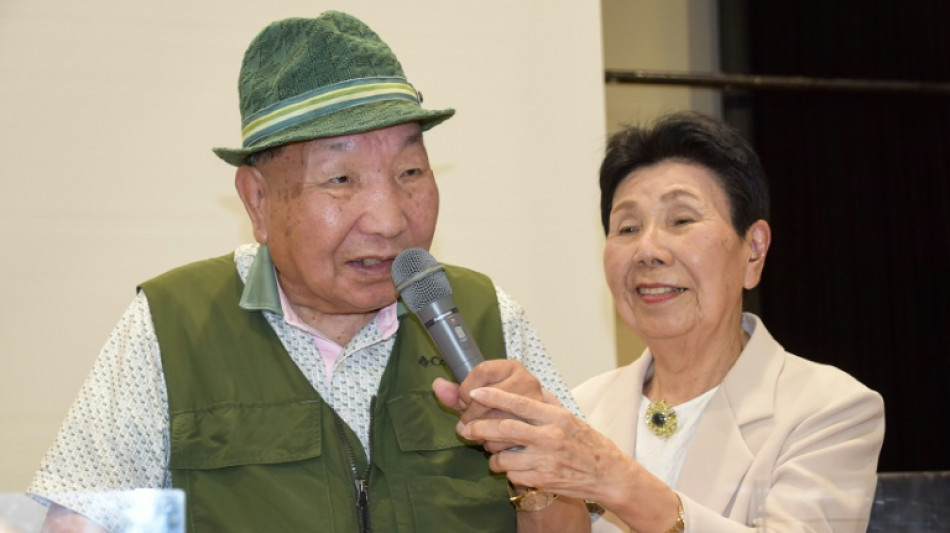
-
 Azam, Rizwan demoted in contracts as Pakistan scrap A category
Azam, Rizwan demoted in contracts as Pakistan scrap A category
-
300-year-old violin to star at UK music festival

-
 Ukraine allies meet with hopes of peace talks breakthrough
Ukraine allies meet with hopes of peace talks breakthrough
-
Mediators await Israeli response to new truce offer

-
 Markram leads South Africa to 296-8 in ODI series-opener
Markram leads South Africa to 296-8 in ODI series-opener
-
Brazil asks Meta to remove chatbots that 'eroticize' children

-
 Markets cautious after Zelensky-Trump talks
Markets cautious after Zelensky-Trump talks
-
Togo tight-lipped as Burkina jihadists infiltrate north

-
 Survivors claw through rubble after deadly Pakistan cloudburst
Survivors claw through rubble after deadly Pakistan cloudburst
-
South Africa quick Rabada out of Australia ODI series with injury

-
 Air Canada flight attendants vow to defy back-to-work order as strike talks resume
Air Canada flight attendants vow to defy back-to-work order as strike talks resume
-
'Call of Duty' to fire starting gun at Gamescom trade show

-
 UN says record 383 aid workers killed in 2024
UN says record 383 aid workers killed in 2024
-
NYC Legionnaires' disease outbreak kills 5

-
 Asian markets cautious after Zelensky-Trump talks
Asian markets cautious after Zelensky-Trump talks
-
Home hero Piastri to have Australian F1 grandstand named after him

-
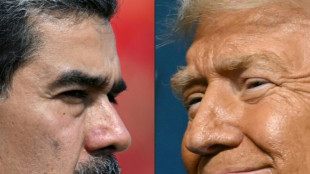 Maduro says mobilizing millions of militia after US 'threats'
Maduro says mobilizing millions of militia after US 'threats'
-
HK scientist puts hope in nest boxes to save endangered cockatoos

-
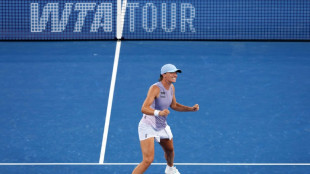 Swiatek beats Paolini to clinch WTA Cincinnati Open title
Swiatek beats Paolini to clinch WTA Cincinnati Open title
-
Brazil's top court rules US laws do not apply to its territory
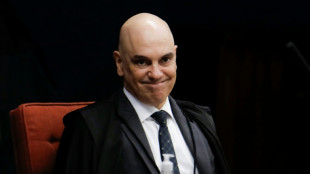
-
 Suits you: 'Fabulous' Zelensky outfit wows Trump
Suits you: 'Fabulous' Zelensky outfit wows Trump
-
Pro-Trump outlet to pay $67 mn in voting defamation case

-
 Downton Abbey fans pay homage to 'beautiful' props before finale
Downton Abbey fans pay homage to 'beautiful' props before finale
-
Republican-led states sending hundreds of troops to US capital

-
 Putin and Zelensky set for peace summit after Trump talks
Putin and Zelensky set for peace summit after Trump talks
-
UN debates future withdrawal of Lebanon peacekeeping force

-
 Trump says arranging Putin-Zelensky peace summit
Trump says arranging Putin-Zelensky peace summit
-
Hurricane Erin douses Caribbean, menaces US coast
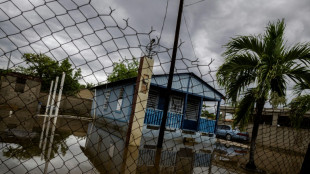
-
 Sinner vows to play US Open after Cincy retirement
Sinner vows to play US Open after Cincy retirement
-
'Ketamine Queen' dealer to plead guilty over Matthew Perry death
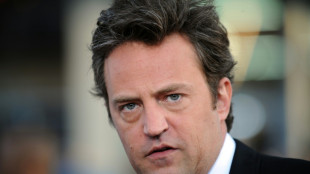
-
 Leeds beat Everton for perfect start to Premier League return
Leeds beat Everton for perfect start to Premier League return
-
'Ketamine Queen' to plead guilty over drugs that killed Matthew Perry
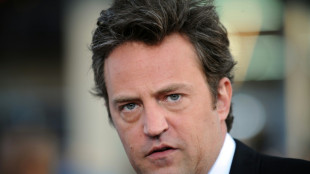
-
 Guirassy sends struggling Dortmund past Essen in German Cup
Guirassy sends struggling Dortmund past Essen in German Cup
-
Stocks under pressure as Zelensky-Trump talks underway

-
 Alcaraz wins Cincinnati Open as Sinner retires
Alcaraz wins Cincinnati Open as Sinner retires
-
Trump floats Ukraine security pledges in talks with Zelensky and Europeans

-
 Doak joins Bournemouth as Liverpool exodus grows
Doak joins Bournemouth as Liverpool exodus grows
-
Excessive force used against LA protesters: rights group

-
 Panama hopes to secure return of US banana giant Chiquita
Panama hopes to secure return of US banana giant Chiquita
-
'Things will improve': Bolivians look forward to right's return

-
 Trump welcomes Zelensky with fresh optimism on peace deal
Trump welcomes Zelensky with fresh optimism on peace deal
-
Israeli controls choke Gaza relief at Egypt border, say aid workers

-
 Air Canada flight attendants vow to defy latest back-to-work order
Air Canada flight attendants vow to defy latest back-to-work order
-
Hurricane Erin drenches Caribbean islands, threatens US coast
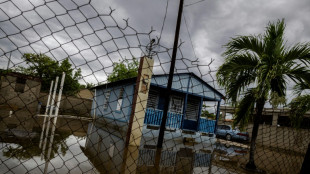
-
 Europeans arrive for high-stakes Trump and Zelensky talks
Europeans arrive for high-stakes Trump and Zelensky talks
-
Trump, Zelensky and Europeans meet in bid to resolve split over Russia
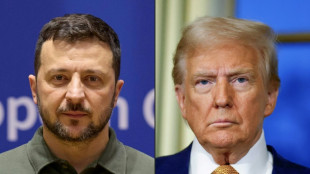
-
 Hamas accepts new Gaza truce plan: Hamas official
Hamas accepts new Gaza truce plan: Hamas official
-
Stocks under pressure ahead of Zelensky-Trump talks

-
 Russian attacks kill 14 in Ukraine ahead of Trump-Zelensky talks
Russian attacks kill 14 in Ukraine ahead of Trump-Zelensky talks
-
Lassana Diarra seeks 65 mn euros from FIFA and Belgian FA in transfer case


Ex-judge fights Japan's 'unopenable door' retrial system
The world's longest-serving death row prisoner, Iwao Hakamada, won compensation from Japan this week after almost five decades in jail -- and he owes his freedom to a judge with steely determination.
The former boxer, now 89, was exonerated last year of a 1966 quadruple murder after a tireless campaign by his sister and others.
But he might still be behind bars if not for Hiroaki Murayama, the judge who in 2014 dared do something extremely rare in Japan's often intractable legal system: he ordered a retrial.
Prosecutors appealed the order andit took nine years for the retrial to open, something which Murayama partly blames himself for after not writing a "more airtight ruling".
But mostly it's because the system is haphazard, outdated and out of step with international standards, the 68-year-old now retired judge said.
"Retrial is supposed to be the last possible measure to save the wrongfully incarcerated, but the system is not functioning as it should," Murayama told AFP in an interview last month.
Lawyers first called for a retrial in 1981: it would take 42 years for that process to actually start.
This week the court that acquitted Hakamada in the retrial -- where it said police had tampered with evidence and carried out "inhumane interrogations" meant to force a confession -- awarded him $1.4 million for his wrongful detention between 1966 and 2014.
However, after decades in solitary confinement, he is now "living in a world of fantasy," his supporters say.
Softly-spoken Murayama, who ordered the retrial but was not involved in the acquittal or compensation order, was stung by the experience and wants change.
"I was once part of that system. And now that I learned what it's really like, it's my responsibility to fix it," he said.
"There can be no more Hakamadas".
- 'Disparities' -
The former judge's experience with one of the worst miscarriages of justice in post-war Japan has made him reflect on the death penalty itself.
Japan's retrial process was shaped a century ago and has since been left nearly untouched.
Critics label it the "Unopenable Door".
Just one percent of around 1,150 retrial applications from all convicts, processed in Japan between 2017 and 2021, won approval.
The justice minister is set this week to ask legal experts to scrutinise the system for possible revisions, but the process could take years.
Factors behind its slowness include the prosecution's power to appeal retrial orders, and some judges failing to push for new, exculpatory evidence.
This, Murayama says, creates "disparities" among applications, with progress dependent on the "work ethics" of each judge.
"Many judges prioritise efficiently solving ongoing criminal cases, because that's often a barometer of their competence", Murayama said.
"Does working hard on retrial applications help judges earn a good reputation? I'm not sure."
- 'Dependent on chance' -
Murayama said he had made it his "team's biggest priority to speed up deliberations" on Hakamada's case.
Decades of detention -- with the threat of execution constantly looming -- took a major toll on Hakamada's mental health.
Murayama said he had been "worried sick" that Hakamada might die while the legal process dragged out.
So he dived into reams of records and chivvied prosecutors.
"It's extremely unlikely that prosecutors give away evidence voluntarily", he said. "You really have to push them."
In the hands of another judge with less initiative, Hakamada's fortune might have turned out differently.
A system "so dependent on chance or luck, isn't a system at all," Murayama said.
Japan and the United States are the only major industrialised democracies with capital punishment, which has broad support from the Japanese public.
Murayama in 2011 sentenced Tomohiro Kato to death for the murder of seven people in a rampage in Tokyo in 2008.
He was hanged in 2022.
"I'm not the one who actually killed him, but I ordered his death nonetheless", Murayama said, adding that he "couldn't sleep for three days" after his hanging.
Murayama said it was a "gut-wrenching decision", but concedes that hanging would remain his only realistic option for Kato were he still a judge -- unless he can argue capital punishment itself is unconstitutional.
"The death penalty involves the state power murdering a defenceless human being. Should we really accept that as a society?", the judge-turned-lawyer said.
Hakamada was post-war Japan's fifth wrongfully convicted death-row inmate who avoided death through a retrial.
"Had they been executed, that would've been an irrevocable catastrophe," Murayama said.
"And don't you dare say it's been just four or five people. Not even one person should suffer this."
N.AbuHussein--SF-PST
